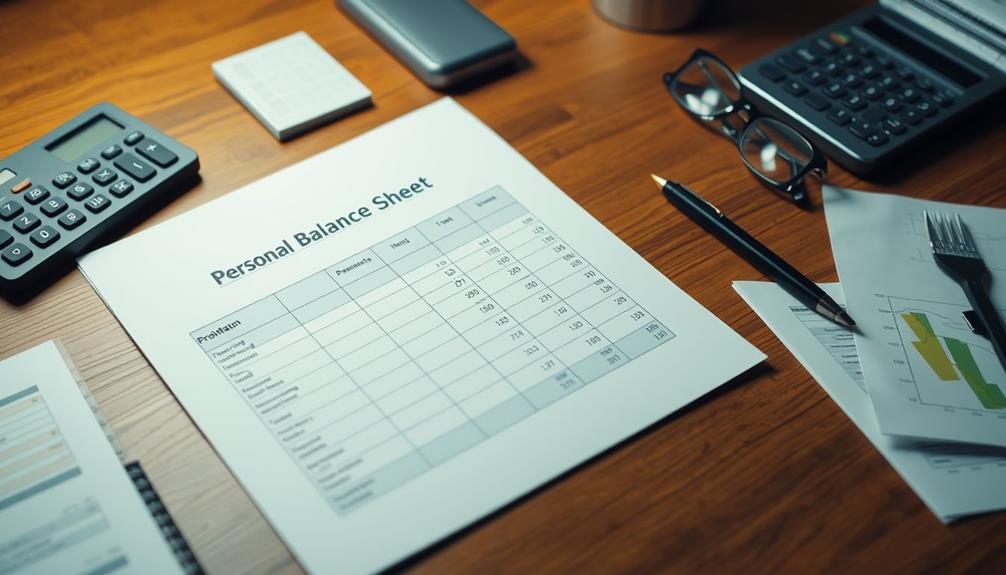The one document that could make or break your financial future is your personal balance sheet. It gives you a clear snapshot of your assets and liabilities, helping you assess your financial health. By calculating your net worth, you can track your progress and make informed decisions. This essential tool encourages accountability, guiding you to manage debts effectively and build resilience. Regular updates keep you aware of changes in your financial situation. Create yours, and you'll be empowered to shape your financial destiny. Keep going, and you'll discover more ways to enhance your financial life. A great starting point is to use a free financial template that works, making it easier to organize your information and get started quickly. With the right tools, you’ll be able to identify opportunities to grow your savings, invest wisely, and tackle financial goals with confidence. Taking this proactive step today can set the stage for lasting financial independence and peace of mind.
Key Takeaways
- A personal balance sheet summarizes your assets and liabilities, providing a clear snapshot of your financial health.
- Regularly updating your balance sheet ensures accurate tracking of your net worth and financial situation.
- Understanding the distinction between assets and liabilities is crucial for achieving your financial goals.
- Effective asset and debt management can enhance your net worth and overall financial future.
- A well-maintained balance sheet is essential for informed decision-making during significant life events and for securing loans.
Importance of a Personal Balance Sheet

A personal balance sheet is fundamental for anyone looking to gain a clear picture of their financial health. It summarizes all your assets and liabilities, giving you a straightforward assessment of your net worth. By regularly updating your balance sheet, you encourage financial accountability and awareness, making it easier to spot changes in your financial status over time. This awareness is essential for effective financial planning, especially when considering common financial terms that impact your overall financial picture.
Moreover, a personal balance sheet simplifies complex financial information during significant life events, such as divorce. It eliminates the confusion that often comes with lengthy financial affidavits, which can feature around 170 line items. Instead, your balance sheet focuses on 20 to 30 key financial items, enhancing usability for ongoing management.
Understanding and maintaining a personal balance sheet not only aids in informed decision-making but also emphasizes the importance of financial literacy in achieving economic stability. When you know where you stand financially, you can make better choices that align with your long-term goals.
Ultimately, having a personal balance sheet is an important step toward securing your financial future, allowing you to navigate life's financial challenges with confidence.
Steps to Create Your Balance Sheet

Creating your balance sheet starts with understanding your assets and liabilities. This foundational step is essential, as it allows you to assess the value of your investments, including potential options like a Gold IRA, which can offer diversification of retirement portfolio vital in a volatile economy.
Once you know what you own and what you owe, you can easily calculate your net worth. Don't forget to update your balance sheet regularly to reflect any changes in your financial situation.
Understanding Assets and Liabilities
Understanding your assets and liabilities is essential for managing your financial future. A balance sheet summarizes all your assets, like cash, real estate, and investments, alongside your liabilities, such as debts, mortgages, and loans. By listing these items, you get a clear snapshot of your financial health at a specific moment.
In addition, being aware of the risks and rewards of Bitcoin IRAs can help you make informed investment decisions as you evaluate your overall financial situation.
To create your balance sheet, group your assets by type—current assets and fixed assets, for instance—and do the same for your liabilities. Make sure to value each item accurately to reflect your true financial situation. This process not only helps you understand what you own and owe but also highlights areas that may need attention or improvement.
Regularly updating your balance sheet is vital. It allows you to track changes in your financial landscape, empowering you to make informed decisions about spending, saving, and investing.
Moreover, having a well-prepared balance sheet can facilitate better financial decision-making and even assist in significant life events, like divorce settlements. Ultimately, mastering the distinction between assets and liabilities sets the foundation for achieving your future financial goals.
Calculating Net Worth
When you're ready to assess your financial health, calculating your net worth is an essential step. Start by creating a balance sheet that lists all your assets. This includes real estate, vehicles, and savings accounts, giving you a complete picture of your financial standing.
Additionally, consider including investments such as a Gold IRA, which can provide a hedge against inflation and enhance your overall portfolio resilience against economic instability tax advantages of Gold IRAs.
Next, detail your liabilities, such as mortgages, credit card debts, and loans. Understanding your total debt obligations is vital for an accurate assessment.
Once you have both lists, calculate your net worth by subtracting total liabilities from total assets. This calculation provides a snapshot of your financial health at a specific moment.
Monitoring your net worth over time can greatly enhance your financial accountability. It allows you to track your financial progress and make informed decisions.
Regularly updating your balance sheet helps reflect changes in asset values or debt levels, ensuring your net worth remains accurate.
Regular Updates and Adjustments
Keeping your balance sheet up to date is crucial for accurately reflecting your financial situation. Regular updates allow you to track changes in your net worth by subtracting total debts from total assets. This clarity helps you understand where you stand financially and what adjustments you may need to make.
Additionally, considering investment options like a Gold IRA can enhance your asset portfolio and provide a hedge against inflation, especially when you explore trusted precious metal IRA options.
Make sure your personal balance sheet includes all assets—like real estate, vehicles, and retirement accounts—and all liabilities, such as mortgages, credit card debts, and loans. By maintaining this thorough view, you promote financial accountability, enabling informed decisions regarding savings and investments.
Regular reviews not only track progress but also enhance your financial literacy. You'll be better equipped to assess property values and monitor the growth or decline in your savings over time.
By simplifying complex financial information into one document, an updated balance sheet plays an essential role in effective financial planning.
Ultimately, these regular updates prepare you for future financial stability, ensuring you're always aware of your financial health and ready to make strategic decisions. Keeping your balance sheet current is a proactive step toward a secure financial future.
Analyzing Assets and Liabilities

Analyzing your assets and liabilities through a personal balance sheet offers a clear snapshot of your financial health, allowing you to make informed decisions. By categorizing your assets—like homes, cars, and retirement accounts—and your liabilities, such as mortgages, credit card debts, and loans, you create a thorough view of your financial position. This understanding is vital for setting and achieving your financial goals.
Additionally, considering diversification strategies, such as investing in gold, can further enhance your financial security and protect against market volatility gold investment strategies.
Regularly updating your balance sheet enhances accountability, enabling you to track changes in your financial status over time. This practice not only helps you assess your progress but also encourages financial literacy. You'll gain insight into how your assets and liabilities impact your overall financial health, which is critical for strategic planning.
Tracking these elements consistently can lead to better decision-making regarding investments and debt management. As you analyze your assets and liabilities, you'll position yourself for long-term financial stability and wealth accumulation.
In significant life events, such as divorce, a clear understanding of your financial standing can even aid in negotiating settlement options. Ultimately, a personal balance sheet empowers you to take charge of your financial future.
The Role of Net Worth

Understanding your net worth is key to grasping your overall financial situation. By calculating it regularly, you can see how well you're managing your assets and liabilities, which directly impacts your financial progress.
This awareness empowers you to make smarter decisions about saving, spending, and investing for your future.
Additionally, staying informed about current trends in private equity markets can help you identify valuable investment opportunities that may enhance your net worth over time.
Understanding Net Worth Calculation
Net worth serves as an important indicator of your financial health, calculated by subtracting your total liabilities from your total assets. This straightforward calculation provides a clear snapshot of where you stand financially.
A positive net worth shows financial stability, which is essential for securing loans and obtaining favorable interest rates. On the other hand, a negative net worth can restrict your borrowing capacity, making it harder to achieve your financial goals.
Additionally, understanding your net worth can inform your decisions about diversifying your investment portfolio, such as considering a Gold IRA rollover to hedge against inflation and economic uncertainty.
Regularly evaluating your net worth helps you track your financial progress over time. It allows you to make informed decisions about budgeting, spending, and investments.
By understanding your net worth, you establish a baseline for growth, enabling you to measure the impact of your financial strategies effectively.
Interestingly, about 30% of Americans are unaware of their net worth, which can hinder effective financial planning and long-term wealth accumulation.
Gaining a clear understanding of your net worth isn't just a number; it's an important tool for achieving your financial goals and ensuring your overall financial health.
Embrace this knowledge to take control of your financial future.
Importance of Asset Management
Effective asset management plays an indispensable role in enhancing your net worth and securing your financial future. Your net worth, the difference between total assets and total liabilities, gives you a clear snapshot of your financial health. By understanding and managing your assets effectively, you can prioritize savings and investments, which can considerably boost your overall wealth over time.
Additionally, implementing SMART criteria in your financial planning allows for more precise goal-setting, ensuring that your asset management strategies are both targeted and achievable.
Many people underestimate the importance of regular net worth assessments, but doing so can motivate you to stay focused on your financial goals. With approximately 30% of Americans having unclaimed assets, proper asset management can reveal hidden potential in your financial situation.
A higher net worth not only reflects your financial success but also influences your borrowing capacity. Lenders often consider your net worth when determining loan eligibility and terms, making it vital to manage your assets wisely.
Tracking Financial Progress Regularly
Keeping a close eye on your net worth is essential for tracking your financial progress. By calculating your net worth—subtracting total liabilities from total assets—you gain a clear snapshot of your financial health. Regularly updating this figure helps you identify trends, making it easier to track progress toward your financial objectives.
Understanding the costs associated with assisted living expenses can also inform your financial planning as you age.
When you actively monitor your net worth, you're better positioned to achieve your goals. You can make informed decisions about spending, saving, and investing based on the changes you observe. Evaluating your net worth quarterly or annually enhances accountability and motivates you to stay disciplined with your finances.
It reinforces the importance of keeping your financial objectives at the forefront of your decisions.
A growing net worth typically indicates improved financial stability, which can enhance your borrowing capacity. This, in turn, opens doors to better opportunities for investments and loans.
Managing Debt Effectively

Managing debt effectively is essential for your financial well-being and future stability. Start by prioritizing high-interest debts, like credit cards with rates exceeding 20%. Tackling these first can improve your overall financial health and boost your credit score.
Maintain a debt-to-income ratio below 36% to enhance your borrowing capacity and guarantee long-term financial stability.
To achieve your financial goals, actively track your progress. You're 40% more likely to meet those goals if you monitor your spending habits. Regularly reviewing your financial statements helps you identify spending patterns, encouraging accountability and effective debt management.
Consider implementing repayment strategies like the snowball or avalanche method. The snowball method focuses on paying off smaller debts first, giving you quick wins and motivation.
In contrast, the avalanche method targets debts with the highest interest rates to save on overall payments. Both approaches can systematically reduce your debt while saving you money on interest.
Building Financial Resilience

While unexpected expenses can throw your finances into disarray, building financial resilience helps you navigate these challenges with confidence. To strengthen your financial foundation, focus on these key strategies:
- Create a Thorough Budget: A solid financial plan can lead to 20% more savings compared to those who don't budget. This structure not only helps you track spending but also enhances your overall financial stability.
- Establish an Emergency Fund: Aim for 3-6 months' worth of living expenses in your emergency fund. This safety net prevents you from relying on high-interest debt when the unexpected occurs.
- Prioritize High-Interest Debt Repayment: Tackling high-interest debt, like credit cards with rates exceeding 20%, can drastically improve your financial health and credit score.
Additionally, regularly tracking your income and expenses boosts your understanding of cash flow, making you 40% more likely to meet your financial goals.
Engaging in consistent financial planning and review allows you to adapt to changing circumstances, reducing stress and enhancing long-term security.
Investment Planning and Growth

Investing wisely is often the key to achieving long-term financial growth and security. A well-structured investment plan is essential for building wealth, especially when you consider that historical data shows average annual stock market returns of 7-10% after inflation.
Regular contributions to retirement accounts can also notably boost your financial stability, with the average 401(k) balance for those aged 55-64 being around $200,000.
To effectively reach your financial goals, it's vital to establish a clear investment strategy. Individuals who track their spending are 40% more likely to meet their financial objectives.
One of the best ways to manage risk and potentially improve returns is by diversifying your investment portfolio across various asset classes like stocks, bonds, mutual funds, and real estate.
Don't overlook the benefits of utilizing tools like robo-advisors for low-cost investment management. They can help simplify your investment experience, ensuring that your portfolio is regularly monitored and rebalanced.
Frequently Asked Questions
What Are the 4 Types of Financial Documents?
You'll find four key financial documents: the income statement, which outlines revenues and expenses; the balance sheet, showing assets and liabilities; the cash flow statement, tracking cash movements; and financial projections, estimating future performance.
What Are the Top 3 Financial Documents?
Did you know 70% of people don't track their finances? The top three financial documents you need are the balance sheet, income statement, and cash flow statement. They'll help you understand your financial health better.
What Are the Three Major Financial Documents?
The three major financial documents you should know are the income statement, balance sheet, and cash flow statement. Each one provides unique insights into your financial health, guiding your decision-making and strategic planning effectively.
What Are the 5 Key Financial Documents?
Did you know nearly 70% of Americans lack a financial plan? To secure your future, focus on these five key documents: balance sheet, income statement, cash flow statement, financial projections, and your thorough financial plan.
Conclusion
Your personal balance sheet is like a compass guiding you through the stormy seas of financial uncertainty. By charting your assets and liabilities, you uncover the treasure of your net worth. As you navigate debt and build resilience, you're not just surviving; you're steering your ship toward a brighter horizon. Embrace this powerful tool, and watch your financial future transform from a foggy shore into a vibrant landscape of opportunities waiting to be explored.










